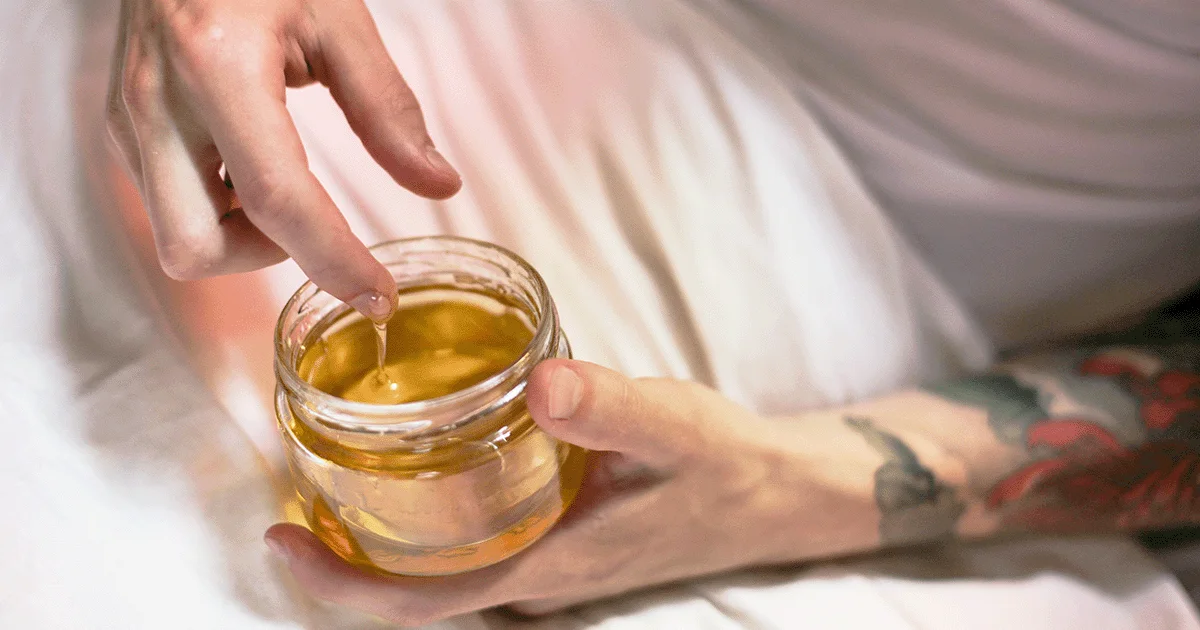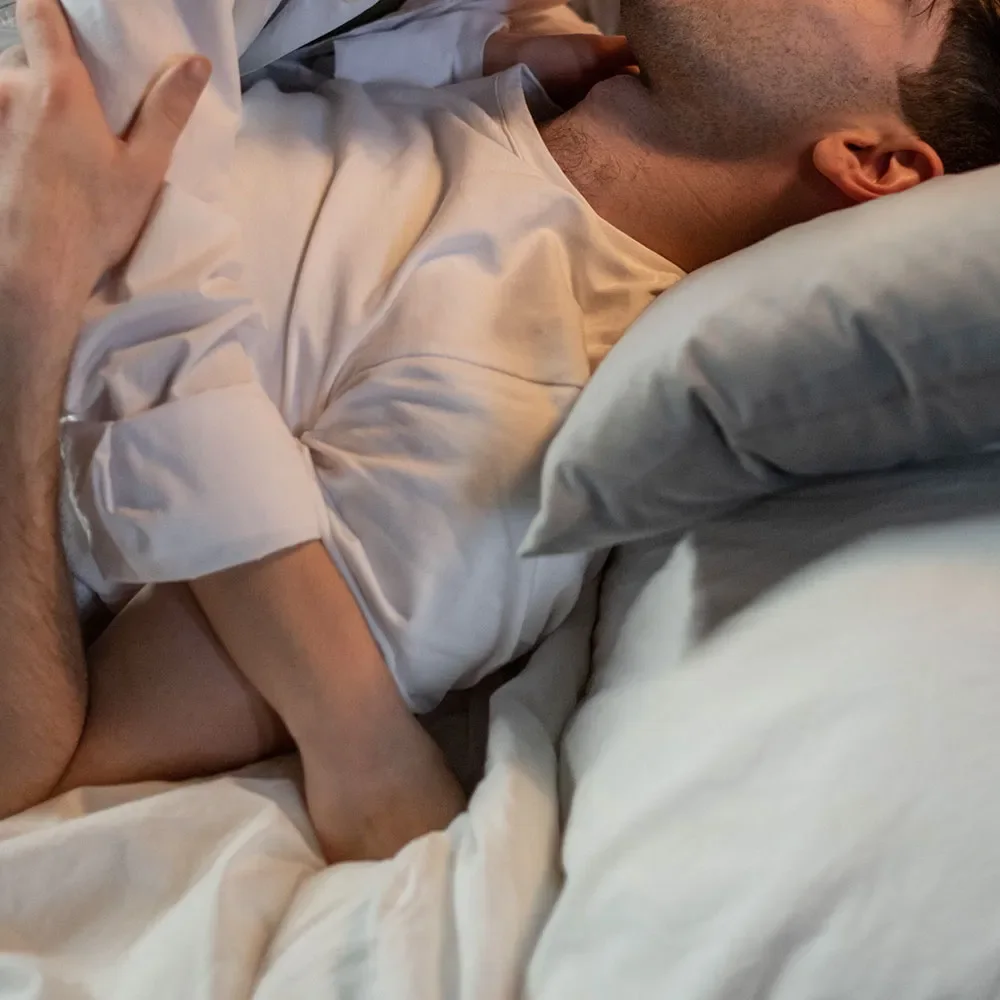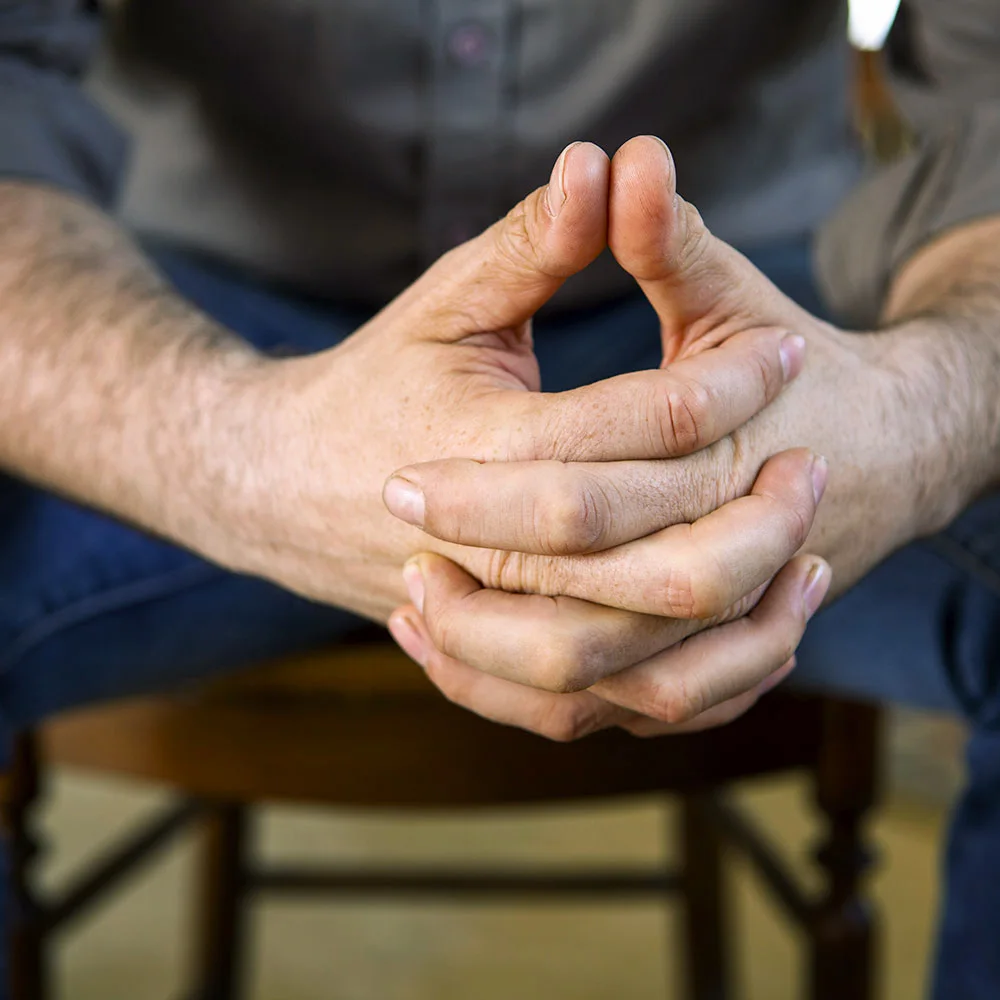Here's what we'll cover
Here's what we'll cover
Here's what we'll cover
Lasting longer in the sheets is a common goal for plenty of men, even though our estimates around how long sex should last are typically off by a mile. For example, sex lasting 3–13 minutes is considered “normal,” with the actual average hovering somewhere around 5.4 minutes (a bit longer if you’re younger, a bit shorter if you’re older).
You may have seen TikToks or articles online sharing apocryphal stories of how drinking this or that can help you last longer in bed. Before we get started, let’s clear the air with some truth: to date, no studies have found a direct link between drinking certain beverages and increased sexual stamina. In general, what you eat and drink has a limited, if any, impact on your sexual performance.
Having said that, there are studies suggesting that different drinks can be better for your health, as well as various factors tied to sexual health in particular, such as blood pressure. Drinking these beverages may indirectly help with sexual performance. Plus, they often boast other health benefits, so what’s the harm in giving them a try?
With that caveat out of the way, let’s take a look at ten drinks that may help you last longer in bed.
What to drink to last longer in bed
Before we dive into the drinks that may have an indirect effect on how long you last in bed, it’s helpful to understand how erections and ejaculation work, exactly. Here’s a quick review:
When you get aroused, your brain sends a message that starts a chemical response throughout your body. It encourages the muscles in your penis to relax and get larger, so blood can rush in and fill it up. At the same time, the veins that allow blood to leave your penis get more rigid, so the blood becomes trapped, creating a hard erection. If there’s a hiccup in that process, it can lead to erectile dysfunction (ED), which is when you can get or stay hard long enough for satisfying sex. While the definition of satisfying sex differs for everyone, if you find that you can’t stave off ejaculation for more than three minutes, it may be a sign of premature ejaculation.
Whether you find that you’ve experienced ED, PE, or both, there are two important things to remember:
They’re both common.
There are safe and effective treatments available for both.
Now, if you’d like to learn more about drinks that will help you last longer, keep in mind that while the drinks below may not directly impact your ability to get or sustain an erection or stave off ejaculation, they can help with other parts of the process, such as improving blood circulation or pressure, your cardiovascular health, or your physical stamina, so you can keep thrusting. Let’s get into it.
1. Water
Water is vital for our overall health and sexual health, too, it turns out. Staying hydrated affects blood pressure and blood flow to your muscles, both of which can impact your erections.
If plain old water is too boring for you, try coconut water instead. Thanks to its high antioxidant content, coconut has long been used as a medical plant to treat impotence and ED. And, studies of rats have found it had a positive effect on various sexual behaviors, from mounting and penetration to ejaculation.
2. Pomegranate Juice
Pomegranate juice is a rich source of antioxidants and plant polyphenols. Animal studies have found that regular consumption of pomegranate extract can reduce oxidative stress, increase blood flow to the penis, and improve smooth muscle relaxation, thereby improving the erectile response.
In one small study of men with mild to moderate ED, participants reported improved erections after drinking pomegranate juice for two months. And while that might sound promising, the researchers did note that statistical significance was not achieved, meaning they couldn’t attribute the better erections to the juice. Another small study of men getting penile implants suggests that drinking pomegranate juice can help improve erections in men with ED who don‘t respond to PDE5 inhibitors like Cialis or Viagra.
3. Green Tea
Similar to pomegranate juice, green tea is rich in antioxidants, polyphenols, and other micronutrients that may offer some benefit to people with ED. In one study, researchers isolated epigallocatechin-3-gallate (EGCG), the most potent antioxidative ingredient in green tea, and fed it to rats. After a period of three months, the researchers found that it improved various markers of the rats’ erectile function, including the relaxation of smooth muscle.
So, you may want to try swapping your cup of coffee for a cup of green tea, or better yet, matcha (a powdered, highly concentrated version of green tea).
4. Ginseng Tea
If green tea isn’t your jam (er, tea), you might try ginseng tea instead. You can also get ginseng on its own or as a dietary supplement.
A scientific review of nine studies of men with mild to moderate ED, aged 20 to 70 years old, found that those who consume the root are more likely to self-report an improved ability to have sex, as well as a mild improvement in their satisfaction with said sex. However, the researchers noted that ginseng may only have a trivial effect, at best, on erectile function and dysfunction, when compared to placebo.
5. Yohimbe Tea
Yohimbe is another type of tea that may help you last longer in bed, albeit according to limited evidence. The bark of the yohimbe tree contains yohimbine, an extract that has often been used as an aphrodisiac in Africa.
Several studies have found that yohimbe outperforms placebo in improving erectile function, although some have found it needs to be combined with other supplements to truly be effective.
6. Ashwagandha Tea
Ashwagandha is yet another extract you can add to tea to potentially strengthen your erections and sexual stamina. The herb has long been used in Ayurvedic medicine to promote better health, stronger muscles, and endurance — all things that can help you last longer during sex.
However, the research is mixed. While several studies have found that ashwagandha can increase serum testosterone levels and sexual well-being, many have also found that it doesn’t have any significant impact on other markers of sexual performance, including fatigue, sexual well-being, or psychogenic ED (erectile dysfunction related to stress, anxiety, depression, or other psychological causes).
7. Beetroot Juice
Studies have found that the nitrates in beetroot juice can have a positive effect on blood pressure in both healthy people and those with hypertension (high blood pressure). Hypertension is strongly associated with ED, which may be caused by either the high blood pressure itself, or the medications taken to manage it.
So, drinking beetroot juice may help improve cardiovascular health and erectile health.
8. Maca Root Powder Smoothie
Maca extract is a root in the mustard family, historically used in the Andes as an aphrodisiac. You can get it as a powder and add it to your morning smoothie.
One study of 50 men with mild ED compared the effects of maca powder with a placebo. After 12 weeks, both groups of men experienced improvements in erectile function, but the effect was more pronounced in those who had the maca root compared with those who took the placebo. Additionally, only the men in the maca group reported improvements in physical and social performance.
However, a separate review of clinical trials using maca found that the evidence for maca in improving sexual function is limited.
9. Watermelon juice
Watermelon is rich in L-citrulline, an amino acid that boosts nitric oxide production. Nitric oxide, in turn, relaxes your blood vessels, which can improve blood flow to the penis during sex.
A small study of men with mild ED found that oral supplements of L-citrulline improved erection hardness, although to a lesser extent than PDE5 inhibitors like Viagra or Cialis. They also ended up having more sex during the treatment period, which is a happy side effect we can all get on board with!
10. Aloe vera
The aloe vera herb — yep, the same one you find in creams and lotions — also has properties that may help with sexual stamina.
The antioxidant has been used as an aphrodisiac thanks to its positive effects on testosterone levels and blood flow, which may indirectly help erections. You can add aloe vera powder to a smoothie or mix the jelly into your drink.
Does alcohol make you last longer in bed?
It depends. While alcohol lowers inhibitions and helps you feel aroused, it can also make it much harder to get and sustain an erection, especially if you binge drink. Alcohol can contribute to dehydration and disrupt nerve communication between the brain and the penis. Together these two factors can make it harder to get hard— hence the notorious “whiskey dick.” Heavy drinking has also been associated with premature ejaculation and blood vessel damage which negatively impacts blood flow to the tissues around the penis which is crucial for getting an erection.
However, some research suggests that light to moderate drinking (1–2 drinks per day) may actually protect against ED.
Alternatives to last longer in bed
Given that the evidence tying drinks to stronger erections is limited, you might be interested in other things you can do to last longer in bed. There are a lot of techniques you can use to last longer during sex, from improving your general health to trying therapy and medication.
Eat well
In a way, what you eat can affect your ability to last as long as you want in bed. Diabetes and hypertension are both associated with premature ejaculation, and both conditions can either be improved or worsened by your diet. People who follow a Mediterranean diet — i.e. a diet high in fruits, vegetables, nuts, fish, and whole grains, but low in red meat and processed foods —are less likely to have ED, and more likely to be sexually active.
Different foods may also help you last longer in bed, including:
Tomatoes
Leafy greens
Peppers
Oysters
Nuts
Coffee
Dark chocolate
Manage your stress
Stress can make it tough to get in the mood in the first place, and once you’re feeling frisky, it can rear its ugly head again, creating performance anxiety. Worse, premature ejaculation makes you feel even more stressed, further adding to your frustration.
Explore meditation and relaxation techniques to lower your stress levels, or consider talk therapy if you need a bit more help.
Exercise regularly
Exercise can help stave off some of the conditions that can contribute to premature ejaculation or ED, such as obesity and high blood pressure. Plus, it’s a great way to relieve stress.
Studies have shown that men who regularly engage in physical activity last longer in bed than those who lead a more sedentary lifestyle. To prevent coming too early, experts recommend exercising at least 30 minutes, five times a week.
Try behavioral techniques
A number of behavioral techniques can help you last longer in bed, including masturbating before sex. Other options include:
The stop-start method, also known as edging. In this method, once you’re about to orgasm, you stop having sex and wait until that “point of no return” feeling subsides. Then, you dive back in.
The squeeze technique. With this one, you also stop right at the brink of climax. Then, you or your partner squeezes the head of your penis until the feeling goes away, and you get back to it.
Pelvic floor exercises. Also known as Kegels, these strengthen your pelvic muscles, so you can better control when you come. These are the same muscles you tighten when you’re trying to avoid going pee. Hold them for a few seconds, then relax, and repeat a few times a day.
Wearing condoms. Adding that extra barrier reduces the sensitivity you feel during sex, which can enable you to last longer.
Changing up your sex positions more often and spending more time during foreplay can also help sex last longer, as can having sex more often. Who’s in?
Address other health issues
Several health conditions have been linked to ED and premature ejaculation, including diabetes, obesity, high blood pressure, high cholesterol, smoking, alcoholism, benign prostatic hyperplasia, and hypogonadism. Treating these conditions may help you last longer in bed.
If you’re dealing with depression, or your stress feels overwhelming, consider talking to someone through therapy. Cognitive behavioral therapy can also be helpful in treating premature ejaculation and other hang-ups around sex.
Ask about medication
If lifestyle changes and the tips above don’t seem to help, talk to your healthcare provider about treatment for premature ejaculation.
Applying topical anesthetic creams, including lidocaine and benzocaine, 20 minutes before sex can make you last longer in bed. But, they can also cause numbness for you and your partner (wearing condoms can prevent the numbness from affecting your partner). SSRIs and antidepressants can also delay ejaculation and may be prescribed off-label for this purpose.
The drugs prescribed to treat ED, namely Viagra (sildenafil) and Cialis (tadalafil), may also be prescribed for premature ejaculation. Some studies suggest that both Viagra and Cialis can delay ejaculation, but others concluded that more research is still needed.
It is totally possible to last longer in bed with some adjustments, whether it’s taking care of your health or finding a prescription that works. Talk to your healthcare provider about your options.
DISCLAIMER
If you have any medical questions or concerns, please talk to your healthcare provider. The articles on Health Guide are underpinned by peer-reviewed research and information drawn from medical societies and governmental agencies. However, they are not a substitute for professional medical advice, diagnosis, or treatment.
Viagra Important Safety Information: Read more about serious warnings and safety info.
Cialis Important Safety Information: Read more about serious warnings and safety info.
References
Bonilla Ocampo, D. A., Paipilla, A. F., Marín, E., et al. (2018). Dietary Nitrate from Beetroot Juice for Hypertension: A Systematic Review. Biomolecules, 8(4), 134. doi:10.3390/biom8040134. Retrieved from https://www.ncbi.nlm.nih.gov/pmc/articles/PMC6316347/
Chauhan, S., Srivastava, M. K., & Pathak, A. K. (2022). Effect of standardized root extract of ashwagandha (Withania somnifera) on well-being and sexual performance in adult males: A randomized controlled trial. Health Science Reports, 5(4), e741. doi:10.1002/hsr2.741. Retrieved from https://www.ncbi.nlm.nih.gov/pmc/articles/PMC9297375/
Chen, D., Zhang, K. Q., Li, B., et al. (2017). Epigallocatechin-3-gallate ameliorates erectile function in aged rats via regulation of PRMT1/DDAH/ADMA/NOS metabolism pathway. Asian Journal of Andrology, 19(3), 291–297. doi:10.4103/1008-682X.178486. Retrieved from https://www.ncbi.nlm.nih.gov/pmc/articles/PMC5427783/
Cormio, L., De Siati, M., Lorusso, F., et al. (2011). Oral L-citrulline supplementation improves erection hardness in men with mild erectile dysfunction. Urology, 77(1), 119–122. doi:10.1016/j.urology.2010.08.028. Retrieved from https://pubmed.ncbi.nlm.nih.gov/21195829/
Corty, E. W. & Guardiani, J. M. (2008). Canadian and American sex therapists' perceptions of normal and abnormal ejaculatory latencies: how long should intercourse last?. The Journal of Sexual Medicine, 5(5), 1251–1256. doi:10.1111/j.1743-6109.2008.00797.x. Retrieved from https://pubmed.ncbi.nlm.nih.gov/18331255/
Erhabor, J. O. & Idu, M. (2017). Aphrodisiac potentials of the ethanol extract of Aloe barbadensis Mill. root in male Wistar rats. BMC Complementary and Alternative Medicine, 17(1), 360. doi:10.1186/s12906-017-1866-1. Retrieved from https://www.ncbi.nlm.nih.gov/pmc/articles/PMC5504857/
Esposito, K., Giugliano, F., Maiorino, M. I., et al. (2010). Dietary factors, Mediterranean diet and erectile dysfunction. The Journal of Sexual Medicine, 7(7), 2338–2345. doi:10.1111/j.1743-6109.2010.01842.x. Retrieved from https://pubmed.ncbi.nlm.nih.gov/20487239/
Forest, C. P., Padma-Nathan, H., & Liker, H. R. (2007). Efficacy and safety of pomegranate juice on improvement of erectile dysfunction in male patients with mild to moderate erectile dysfunction: a randomized, placebo-controlled, double-blind, crossover study. International Journal of Impotence Research, 19(6), 564–567. doi:10.1038/sj.ijir.3901570. Retrieved from https://pubmed.ncbi.nlm.nih.gov/17568759/
Gur, S., Rezk, B. M., Abd Elmageed, Z. Y., et al. (2017). Characterisation of pomegranate juice effects on human corpus cavernosum. Andrologia, 49(8), 10.1111/and.12712. doi:10.1111/and.12712. Retrieved from https://pubmed.ncbi.nlm.nih.gov/27785815/
Kilinc, M. F., Aydogmus, Y., Yildiz, Y., et al. (2018). Impact of physical activity on patient self-reported outcomes of lifelong premature ejaculation patients: Results of a prospective, randomised, sham-controlled trial. Andrologia, 50(1), 10.1111/and.12799. doi:10.1111/and.12799. Retrieved from https://pubmed.ncbi.nlm.nih.gov/28261848/
Krishnappa, P., Fernandez-Pascual, E., Carballido, J., et al. (2019). Sildenafil/Viagra in the treatment of premature ejaculation. International Journal of Impotence Research, 31(2), 65–70. doi:10.1038/s41443-018-0099-2. https://pubmed.ncbi.nlm.nih.gov/30837718/
Kroeger, N., Belldegrun, A. S., & Pantuck, A. J. (2013). Pomegranate Extracts in the Management of Men's Urologic Health: Scientific Rationale and Preclinical and Clinical Data. Evidence-Based Complementary and Alternative Medicine: eCAM, 2013, 701434. doi:10.1155/2013/701434. Retrieved from https://www.ncbi.nlm.nih.gov/pmc/articles/PMC3622365/
Lee, H. W., Lee, M. S., Kim, T. H., et al. (2021). Ginseng for erectile dysfunction. The Cochrane Database of Systematic Reviews, 4(4), CD012654. doi:10.1002/14651858.CD012654.pub2. Retrieved from https://www.ncbi.nlm.nih.gov/pmc/articles/PMC8094213/
Li, S., Song, J. M., Zhang, K., et al. (2021). A Meta-Analysis of Erectile Dysfunction and Alcohol Consumption. Urologia Internationalis, 105(11-12), 969–985. doi:10.1159/000508171. Retrieved from https://pubmed.ncbi.nlm.nih.gov/34521090/
Lopresti, A. L., Drummond, P. D., & Smith, S. J. (2019). A Randomized, Double-Blind, Placebo-Controlled, Crossover Study Examining the Hormonal and Vitality Effects of Ashwagandha ( Withania somnifera) in Aging, Overweight Males. American Journal of Men's Health, 13(2), 1557988319835985. doi:10.1177/1557988319835985. Retrieved from https://pubmed.ncbi.nlm.nih.gov/30854916/
Mamidi, P. & Thakar, A. B. (2011). Efficacy of Ashwagandha (Withania somnifera Dunal. Linn.) in the management of psychogenic erectile dysfunction. Ayu, 32(3), 322–328. doi:10.4103/0974-8520.93907. Retrieved from https://www.ncbi.nlm.nih.gov/pmc/articles/PMC3326875/
Naz, A., Butt, M. S., Sultan, M. T., et al. (2014). Watermelon lycopene and allied health claims. EXCLI Journal, 13, 650–660. Retrieved from https://www.ncbi.nlm.nih.gov/pmc/articles/PMC4464475/
Nimrouzi, M., Jaladat, A. M., & Zarshenas, M. M. (2018). A panoramic view of medicinal plants traditionally applied for impotence and erectile dysfunction in Persian medicine. Journal of Traditional and Complementary Medicine, 10(1), 7–12. doi:10.1016/j.jtcme.2017.08.008. Retrieved from https://www.ncbi.nlm.nih.gov/pmc/articles/PMC6957810/
Nunes, K. P., Labazi, H., & Webb, R. C. (2012). New insights into hypertension-associated erectile dysfunction. Current Opinion in Nephrology and Hypertension, 21(2), 163–170. doi:10.1097/MNH.0b013e32835021bd. Retrieved from https://pubmed.ncbi.nlm.nih.gov/22240443/
Odigie, E. B., Atoigwe, B. E., Francis, B., et al. (2022). Regulation of male sex hormones strongly heightens copulation behavior indices in rat's model administered Cocos nucifera husks extract. African Health Sciences, 22(2), 410–419. doi:10.4314/ahs.v22i2.47. Retrieved from https://www.ncbi.nlm.nih.gov/pmc/articles/PMC9652628/
Ozcan, L., Polat, E. C., Onen, E., et al. (2017). Effects of Tadalafil 5 mg Dosed Once Daily in Men with Premature Ejaculation. Urologia Internationalis, 98(2), 210–214. doi:10.1159/000445839. Retrieved from https://pubmed.ncbi.nlm.nih.gov/27160247/
Palma, L., Marques, L. T., Bujan, J., et al. (2015). Dietary water affects human skin hydration and biomechanics. Clinical, Cosmetic and Investigational Dermatology, 8, 413–421. doi:10.2147/CCID.S86822. Retrieved from https://www.ncbi.nlm.nih.gov/pmc/articles/PMC4529263/
Panchatsharam, P. K., Durland, J., & Zito, P. M. (2023). Physiology, Erection. StatPearls. Retrieved from https://www.ncbi.nlm.nih.gov/books/NBK513278/
Raveendran, A. V., & Agarwal, A. (2021). Premature ejaculation - current concepts in the management: A narrative review. International Journal of Reproductive Biomedicine, 19(1), 5–22. doi:10.18502/ijrm.v19i1.8176. Retrieved from https://www.ncbi.nlm.nih.gov/pmc/articles/PMC7851481/
Shin, B. C., Lee, M. S., Yang, E. J., et al. (2010). Maca (L. meyenii) for improving sexual function: a systematic review. BMC Complementary and Alternative Medicine, 10, 44. doi:10.1186/1472-6882-10-44. Retrieved from https://pubmed.ncbi.nlm.nih.gov/20691074/
Sooriyamoorthy, T. & Leslie, S. W. (2023). Erectile Dysfunction. StatPearls. Retrieved from https://www.ncbi.nlm.nih.gov/books/NBK562253/
Waldinger, M. D., Quinn, P., Dilleen, M., et al. (2005). A multinational population survey of intravaginal ejaculation latency time. The Journal of Sexual Medicine, 2(4), 492–497. doi:10.1111/j.1743-6109.2005.00070.x. Retrieved from https://pubmed.ncbi.nlm.nih.gov/16422843/
Wang, W. F., Wang, Y., Minhas, S., et al. (2007). Can sildenafil treat primary premature ejaculation? A prospective clinical study. International Journal of Urology: Official Journal of the Japanese Urological Association, 14(4), 331–335. doi:10.1111/j.1442-2042.2007.01606.x. https://pubmed.ncbi.nlm.nih.gov/17470165/
Wang, X. M., Bai, Y. J., Yang, Y. B., et al (2018). Alcohol intake and risk of erectile dysfunction: a dose-response meta-analysis of observational studies. International Journal of Impotence Research, 30(6), 342–351. doi:10.1038/s41443-018-0022-x. Retrieved from https://pubmed.ncbi.nlm.nih.gov/30232467/
Wibowo, D. N. S. A., Soebadi, D. M., & Soebadi, M. A. (2021). Yohimbine as a treatment for erectile dysfunction: A systematic review and meta-analysis. Turkish Journal of Urology, 47(6), 482–488. doi:10.5152/tud.2021.21206. Retrieved from https://www.ncbi.nlm.nih.gov/pmc/articles/PMC9612744/
Yildiz, Y., Kilinc, M. F., & Doluoglu, O. G. (2018). Is There Any Association Between Regular Physical Activity and Ejaculation Time?. Urology Journal, 15(5), 285–289. doi:10.22037/uj.v0i0.4031. Retrieved from https://pubmed.ncbi.nlm.nih.gov/29681052/
Zenico, T., Cicero, A. F., Valmorri, L., et al. (2009). Subjective effects of Lepidium meyenii (Maca) extract on well-being and sexual performances in patients with mild erectile dysfunction: a randomised, double-blind clinical trial. Andrologia, 41(2), 95–99. doi:10.1111/j.1439-0272.2008.00892.x. Retrieved from https://pubmed.ncbi.nlm.nih.gov/19260845/










